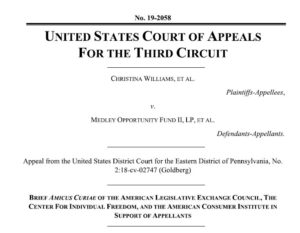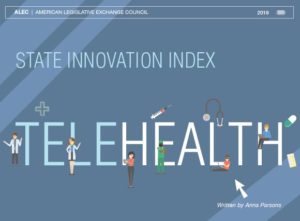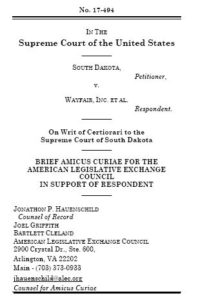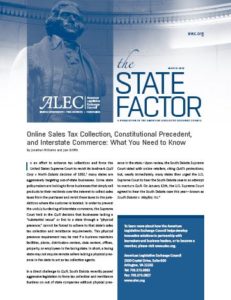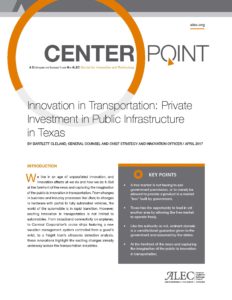Innovation
Key Points
- Public policy relating to communications and technology should be driven by free market principles.
- The Internet must remain free from intermediary criminal liability under state laws for Internet businesses, and today’s approach that allows the competitive marketplace to generate innovative and welfare-enhancing platforms for consumer services online, free from excessive governmental regulation and overreaching state criminal law enforcement must be maintained.
- Regulations should target actual harms to consumers or to public health or safety, and should not stifle innovation, competition, or access to technologies.
- Voluntary codes of conduct, industry-driven standards and individual empowerment should be preferred over government regulation.
Whether improving processes, creating products or developing new ideas, the application of technology can enable real changes in how state government works, both in quality of services delivered to constituents, cost savings and quality of life.
States have the opportunity in our national balance of government power, to address policy challenges through innovation and experimentation, to lead by being the “laboratories of democracy.” Most of the challenges are not easy, but innovation is often the way through, and states are best equipped for this challenge. Confronting challenges in these “laboratories,” and taking the risks to create a better tomorrow provides a best practices blueprint for other states and the federal government. States are the incubators of solutions. But even when the creative goes astray, the experience provides valuable insight for other states as they grapple with their challenges.
Solving real problems with relevant solutions is the key to any successful public policy agenda. In other words, innovation is just as much about identifying the problem as it is about creating the solution. The secrets of America’s success at invention are flexibility, the willingness to experiment and learn from mistakes, an inherent love of risk taking, adventure, discovery, entrepreneurship, the internal drive that gives permission to imagine and invent, the freedom to succeed and the freedom to fail…and a sensible government that stays out of the way of the magic. This is innovation.
Model Policies
-
Resolution on the Importance of Pursuing Trade Agreements that Contain Robust Intellectual Property Rights Protections Final
WHEREAS, Americans are deeply concerned with job creation, economic stability, and expanding economic prosperity throughout the United States; and WHEREAS, international trade is a critical engine of growth for the U.S. economy; and WHEREAS, the United States exported more than $2.5 trillion in goods and services accounting for 11.2 percent…
-
Statement of Principles on State Taxation of Digital Advertising and Data Usage Final
Statement of Principles Opposition to Discriminatory Tax Treatment Well-crafted tax policy should not favor one form of commerce over another. Policies that target digital goods and services for taxation that their traditional counterparts do not face arbitrarily favor the latter, creating a competitive imbalance. Tax policy should be carefully structured…
-
Establishing a Public-Private Partnership (P3) Office Act Final
Model Policy {Title, enacting clause, etc.} Section 1. {Title} This Act may be cited as the “Establishing a Public-Private Partnership (P3) Office Act.” Section 2. {Definitions} The following definitions apply in this section: (A) “Contract” means any purchase and sale agreement, lease, service agreement, franchise agreement, concession agreement,…
-
Targeted Regulatory Sandbox Act Final
Purpose: This proposal modifies provisions related to the (insert relevant state agency) and allows businesses, under the observation of regulators, to trial new products, services, and business models while bypassing regulations unsuited for their innovative idea. Section 1. Highlighted Provisions. This bill: defines terms; creates an ____________ regulatory sandbox program…
-
Universal Regulatory Sandbox Act Final
Purpose: This proposal modifies provisions related to the (INSERT RELEVANT STATE AGENCY) and allows businesses, under the observation of regulators, to trial innovative products, services, and business models while temporarily bypassing laws or regulations that may conflict. Section 1. State’s Open Records Provisions. ● Insert relevant state open…
-
Resolution on Environmental and Economic Stewardship Final
Model Resolution WHEREAS, [state] has a tradition of supporting good stewardship of our land, air, and water; WHEREAS, [state] is a leader in technological innovation, ingenuity in problem-solving, and working together to create solutions; WHEREAS, preservation of [state’s] economic longevity and role as a leader in fiscal responsibility depends on…
Press Releases
-
New Report Urges Uniformity in Legislation Regarding Drone Operations
Arlington, VA (October 13, 2016)— An estimated 2.8 million drones will be purchased in the United States this year alone as interest in the new technology has soared in recent…
-

Texas State Representative Phil King Named Chairman of American Legislative Exchange Council (ALEC) Center for Innovation and Technology
The Center provides state lawmakers with guides, data, research and a structure to imagine and create a plan of action for how innovation could benefit their states. Whether improving processes, creating products or developing new ideas, the Center provides a place for breakout inspiration and examination of policy improvements. The Center is led by ALEC Vice President Bartlett Cleland.

